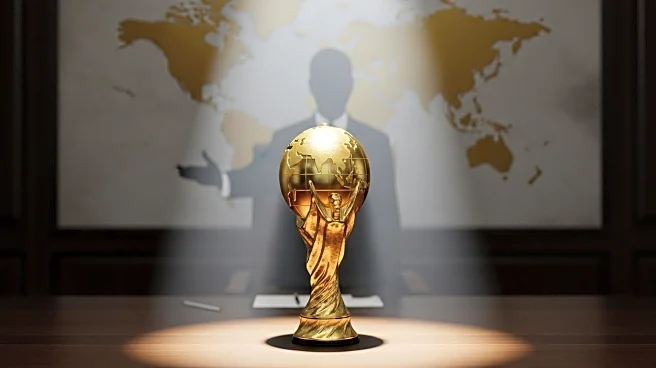What is the story about?
What's Happening?
Guadalupe Gonzalez, a former Miss Universe Paraguay, has made a public appeal to President Trump to relax visa restrictions for Paraguayan soccer fans wishing to attend the 2026 FIFA World Cup in the United States. Gonzalez, who met Trump during the 2013 Miss Universe pageant, posted a video on Instagram wearing Paraguay's national team jersey, urging for easier access to U.S. visas. The plea comes as Paraguay returns to the World Cup after 16 years, and amid broader concerns about visa access for fans from countries outside the U.S. Visa Waiver Program. The U.S. State Department has indicated that Paraguayan fans have time to schedule visa interviews, but logistical challenges remain, with current wait times for visa appointments in Asunción at about three months.
Why It's Important?
The issue of visa access is critical as the U.S. prepares to co-host the 2026 World Cup with Canada and Mexico. The tournament is expected to draw a significant number of international visitors, and visa restrictions could impact attendance and tourism revenue. Paraguay, along with other countries like Iran and Colombia, requires a B1/B2 visa for entry into the U.S., which involves a rigorous application process. The denial rate for Paraguayan visa applications was 18.9% in fiscal year 2024, highlighting the challenges fans face. The situation is further complicated by existing travel bans affecting countries like Iran, potentially limiting participation from officials and fans.
What's Next?
The official World Cup draw is scheduled for December 5 at the Kennedy Center in Washington, D.C., with President Trump expected to attend. As the event approaches, there may be increased pressure on U.S. authorities to streamline visa processes to accommodate the influx of international fans. National soccer federations and human rights organizations are likely to continue advocating for more accessible visa policies to ensure broader participation in the tournament.
Beyond the Headlines
The visa issue underscores broader themes of accessibility and inclusivity in global sporting events. The U.S.'s handling of visa applications for the World Cup could set a precedent for future international events, influencing how countries balance security concerns with the need to welcome global visitors. The situation also highlights the ongoing impact of U.S. immigration policies on international relations and cultural exchanges.














